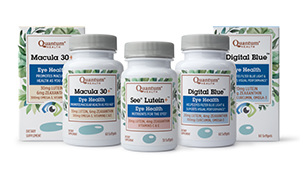Eye health remains a strong category as supplementation becomes essential, and not just for Baby Boomers.
The sense that more than 80 percent of Americans worry most about losing is vision, according to a 2010 nationwide survey conducted by Harris Interactive. And eye disease is a big problem: eight million people are at risk for experiencing agerelated macular degeneration (AMD), and 1.75 million people have an advanced form of AMD, according to the National Eye Institute. It is expected that the number of people who have AMD will double by the year 2020. Further, according to the Centers for Disease Control and Prevention (CDC), approximately 14 million Americans aged 12 years and older have selfreported visual impairment defined as distance visual acuity of 20/50 or worse. Among them, more than 11 million Americans could have improved their Vision to 20/40 or better with refractive correction.
Additionally, the Natural Marketing Institute (NMI) has reported that Baby Boomer respondents said that vision problems are one of their biggest fears about aging. “It’s no secret that vision starts to deteriorate because of the aging process; so many Americans are looking for safe, natural solutions to preserve their eyesight into their senior years. Regular checkups, a healthy diet and plenty of dietary antioxidants are crucial to maintaining optimal eye health,” said Trisha Sugarek MacDonald, MS, BS, director of R&D and national educator with Texas-based Bluebonnet Nutrition.
Sales of vision supplements in the U. S. reached $370 million in 2010, a six percent increase over the previous year, according to estimates by Nutrition Business Journal. “The market is definitely expanding as more patients and eye care professionals understand the value of supplements for both anterior segment and macula pathology, as well as everyday common conditions such as dry eye,” said Keri Marshall, MS, ND, chief medical officer of California-based Nordic Naturals. “Baby Boomers are driving the trends in sales and marketing. That said, steady increases do come from individuals of all ages learning of the value of supplementation on their own, and from eye care professionals prescribing supplements to patients.”
Although Boomers are the main target audience for vision health supplements, prevention should start early, said MacDonald. “In fact, as early as our teens it is suggested that we wear sunglasses, eat right and obtain annual checks to maintain the health of the eyes as we age and keep our vision intact.”
Vision Concerns
Many individuals with anterior segment inflammatory conditions related to the eyelids and ocular surface have tried artificial tears and ointments to relieve their discomfort, with little to no success. With these chronic inflammatory conditions, such individuals need maintenance therapy once the acute phase is managed, explained Marshall. “This is where nutritional supplements like omega-3s, which have a powerful antiinflammatory effect, can help. People with systemic diseases, such as rosacea, are very likely to have ocular surface manifestations, and 2-4 g of high-quality EPA+DHA can provide a nutritional foundation to help support the health of the eyes. DHA is also especially important for the normal function of the retina, which faces the threat of macular degeneration as a person ages. So, DHA supplementation will always be beneficial to overall eye health.”
Additionally, a study by Duke University reported that half of Americans over the age of 65 would eventually develop one of four major eye diseases:
• Cataracts—An eye condition in which the lens becomes covered in an opaque film that affects sight, eventually causing total loss of sight, cataracts usually affects older individuals and is generally found in both eyes.
• Glaucoma—An eye condition that develops when too much fluid pressure builds up inside of the eye. The increased pressure, called intraocular pressure, can damage the optic nerve, which transmits images to the brain. If damage to the optic nerve from high eye pressure continues, glaucoma will cause loss of vision.
• Diabetic Retinopathy— Damage to the retina caused by complications of diabetes mellitus, which can eventually lead to blindness, diabetic retinopathy is an ocular manifestation of systemic disease that affects up to 80 percent of all patients who Have had diabetes for 10 years or more.
• AMD—The most common cause of irreversible blindness in the industrialized world, AMD occurs in the light sensitive cells of the macula found in the middle of the retina and is manifested by a blurring of the central vision, said MacDonald.
According to David Wygal, CN, nutritionist at Healthfair Natural & Organic Market and Vitamin Center based in New Jersey, glaucoma and cataracts are the most common complaints he hears from customers concerned with their vision health. “This drives the consumer to condition-specific nutritional products with the hard science to back up the benefits. Research on the supplements with clear results always helps move the products.”
Natural Eye Care
Certainly, eye supplements can help the body get enough of the valuable nutrients needed each day for healthy vision. Since inflammation is often implicated in common, chronic eye conditions, natural anti-inflammatory agents such as omega-3s EPA and DHA are an excellent choice, offered Marshall. “However, the benefits of any omega-3 supplement depend critically on freshness, so choosing one that meets international standards for freshness (and purity) is essential for optimal effectiveness. In addition, the delivery vehicle must allow for appropriate release for optimal absorption and minimal unpleasant effects such as aftertaste.” Nordic Naturals offers concentrated Ultimate Omega®, and Omega Vision® with added natural carotenoids lutein and zeaxanthin. “I recommend these highquality products for macular health and overall eye health,” Marshall said.
An outstanding vision supplement is one that provides synergistic antioxidant nutrients vitamin E and C with a full spectrum of mixed carotenoids derived from natural plant sources, added Stacey Gillespie, director of marketing at New Hampshire-based MegaFood. “Mixed carotenoids help to protect light-exposed tissues of the eye such as the retina. Specifically, MegaFood’s Vision Strength is a formula designed to provide a full spectrum of mixed carotenoids from a marigold concentrate combined with colorful and carotenoid-rich botanicals such as kale and bilberry fruit,” she said.
According to Bluebonnet’s MacDonald, a full rainbow assortment on one’s plate is the key to giving the body the nutrients it needs to build cells correctly and strengthen the immune and detoxification systems so they can do a better job of fighting off disease and aging. “When considering a diet to support one’s vision and eye health, it is best to think and eat in color. Plant foods that are represented by the rainbow can be the most influential tools to reduce oxidative stress and to curb the damaging effects of daily living that may compromise one’s vision. The colors of the rainbow that are most influential include red, orange-yellow, green, blue-purple and white-brown-tan foods. This is because they contain the ever-important vitamins, A, C, E, B2 and B3 plus the minerals zinc, selenium and chromium.”
Bluebonnet offers a variety of vision health products, including its Eye Antioxidant Formula Vcaps, now with zeaxanthin, which are specially formulated with a high potency combination of all the important amino acid, vitamin, mineral and herbal antioxidants in easy-to-swallow vegetable capsules for maximum assimilation and absorption. “Zeaxanthin is a powerful, natural antioxidant that protects the eye by absorbing destructive blue light and reducing glare that can lead to detrimental health risks, such as cataracts and/or AMD. Blue light from harmful UV rays can cause harmful oxidative stress in the eye,” explained MacDonald. “Zeaxanthin protects cells and membranes via reducing harmful free radicals by donating electrons to reactive oxygen species (ROS), thus reducing oxidative stress within the body and more importantly in the eyes. This action helps maintain the integrity of the eye for optimal visual health.”
From Manufacturers to Retailers
It is essential for retailers to make their Vision health department attractive, interactive and informative for consumers—no matter their age, MacDonald added. “Cross merchandise ‘eye healthy’ products on an end cap combining dietary supplements and packaged foods for eye health,” she offered.“Additionally, you can incorporate signage on omega-3 heart benefits; this will allow not only sales in whole body, but also the grocery. Furthermore, you could provide a basket of fresh fruit and veggies, addressing the requirement that Americans get five to nine servings of fresh produce every day for healthy living.”
MacDonald also noted retailers would want to avoid too much product redundancy. “Focus on one particular Vision health subcategory or pick three popular items across the vision health categories for an overall vision/eye health approach and then rotate on a monthly basis,” she advised.
Moreover, it is important that retailers become knowledgeable about their supplements, and the vision health category is no exception. “Details really matter when choosing a top-quality omega-3 supplement,” said Nordic Natural’s Marshall. “Retailers need to pass this knowledge on to customers, so that they can choose what’s best when shopping for supplements.” Nordic Naturals has a comprehensive education program that brings greater access of information to the field, sponsors educational events and seminars, reaches out to experts in the field, and consistently maintains integrity and transparency of its raw material sourcing and omega-3 manufacturing, she said.
“Education is at the heart of our industry,” added MegaFood’s Gillespie. “We are working directly with a select group of retailers to develop effective educational programs based on science-based content from Andrew Weil, MD. The goal is to empower retailers on their knowledge of natural health and provide tools, from literature to technology, that help them convey this to their customers.”
Extra! Extra!
Visit vitaminretailer.com to read about a link between vitamin D and AMD.
For More Information:
■ Bluebonnet Nutrition,(800) 580-8866
■ MegaFood, (800) 848-2542
■ Natural Factors, (800) 322-8704
■ Nordic Naturals, (800) 662-2544
Five Nutrients for Total Eye Health
Nutritional factors play an enormous role in the prevention and treatment of the leading causes of impaired vision in North America— cataracts and macular degeneration. In both of these conditions, the normal protective mechanisms are unable to prevent damage to the lens and macula, respectively. According to Michael Murray, ND, author of more than 30 books on health nutrition and director of product development and education for Natural Factors Nutritional Products, special dietary supplements are essential in maintaining eye health, preventing these diseases and improving visual function when these conditions develop.
1. Lutein—Critically important to the health of the macula, especially the central portion of the macula (the fovea) are the carotenes lutein and zeaxanthin. In fact, the fovea owes its yellow color to its high concentration of lutein and zeaxanthin. These yellow carotenes function in preventing oxidative damage to the area of the retina responsible for fine vision and obviously a central role in protecting against the development of macular degeneration. A low level of lutein and zeaxanthin within the macular represent a major risk factor for the disease, as patients with macular degeneration have 35-40 percent less lutein in their Maculas than people without macular degeneration. In addition, new research shows that supplementing the diet with lutein and zeaxanthin not only helps to protect against macular degeneration, it can actually improve visual function in people with macular degeneration.
2. Flavonoid-rich Extracts—Flavonoid-rich extracts of blueberry, bilberry, pine bark or grape seed also offer valuable benefits in improving eye health as well as protecting against cataracts and macular degeneration. In addition to possessing excellent antioxidant activity, these extracts have been shown to exert positive effects on improving blood flow to the retina as well as improving visual processes especially poor night vision.
3. Nutritional Antioxidants—Nutritional antioxidants such as betacarotene, vitamins C and E, zinc, copper and selenium are extremely important for eye health. While research has often focused on just one of these nutrients, studies conducted by the Age-Related Eye Disease Study Research Group (AREDS) confirm that a combination of these nutrients produce better results than any single nutrient alone. Yet, even something as simple as taking vitamin C or zinc can produce dramatic effects in preserving Eye health. Zinc is perhaps the most important mineral for eye health as it plays an essential role in the metabolism of the retina and the visual process—plus it is required as a component of the antioxidant enzyme super oxide dismutase (SOD).
4. Coenzyme Q10 (CoQ10) and Acetyl-L-Carnitine—These two nutrients play a critical role in energy production. For example, the role of CoQ10 in our cells is very is very similar to the role of a spark plug in a car engine while acetyl-L-carnitine functions as the fuel injection system. Just as the car cannot function without that initial spark, cells in our body cannot function properly without CoQ10 and carnitine. CoQ10 and carnitine perform their functions primarily in the mitochondia—the cell’s energy producing compartment.
5. Fish Oils—There is a strong relationship between hardening of the arteries (atherosclerosis) and eye health. So, just as in atherosclerosis, omega-3 fatty acids from fish oils play an important role in prevention of eye conditions like macular degeneration. The recommended dosage of a fish oil supplement to support eye health is enough to provide approximately 1,000 mg of EPA+DHA, the two important omega- 3 fatty acids.













